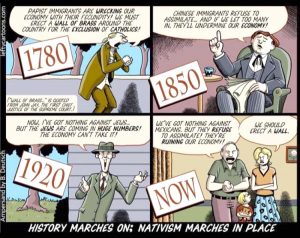— Beginning of Week Two —

My initial reaction to this week’s readings was that of a general overtone throughout each piece within itself can be found, which connects it to one another; I think that it is additionally important to note how each and every one of us establishes our own thoughts and interpretations as well. This is essentially what makes conversations, and research such as this intriguing and fulfilling.
For me, reflecting upon my own encounters with life, and attempting to understand the state in which we currently find the United States through various perspectives has helped me think about the topic of migration in a more personal spectrum. It is quite apparent that the United States is a nation created solely by immigrants, who migrated here through various different channels, over different periods of time. One of the things that stood out to me while reading the journal written by Gabbacia was the way she depicted the importance of migration for every single person; migration clearly has a purpose, no matter how different it may be depending on the situation at hand in the face of history. I think this is something that I personally want to create a deeper understanding for the Wichita Falls community within itself; why do people migrate to a town this small – what resources are in this city that create an environment and sense of home that makes people from all over the United States call migrate to? A sense of community is later on established as one can hope for them, and this place that was once foreign becomes home for the migrants.
I personally think it’s rather amusing whenever the topic of “historical myth” or simply put, the myth’s behind our nation’s history is brought up in conversation, texts, articles, etc because up until a year ago I never thought about this possibility. I remember talking about the topic of “Exceptionalism” in Dr. Leland Turner’s Texas history course last Fall 2016, where he helped our class ask and answer the pressing question: what makes our state, or our country for example, exceptional? The idea of being exceptional within itself boosts our ego as Americans, and often times as I’ve seen it makes individuals feel powerful simply because of the country they call home.
I think it’s interesting to see how the United States tends to reject certain groups of people from migrating into the country, and accepting others freely. This of course leads into a sensitive topic for some when discussing racial inequality, and how we as Americans deal with specific groups of people seeking citizenship, refuge, or any kind of form of migration into the United States. I personally would like to see if that has been an issue for the City of Wichita Falls, and if all communities who have ventured into their county in the hopes of migration, have been accepted.
The readings have helped me begin forming further questions that I would like to dive deeper into and answer within our project; what does it exactly mean to be a “melting pot” nation if we don’t necessarily have a rather kind history when it comes to the treatment of certain groups who chose to migrate to the United States. One thing aside from the reading that I would like to point out, was the Political Cartoon that Dr. Dunn shared with us on Slack; I definitely think that this helped me get the wheels in my mind going when reflecting over the reading.

I look forward to discussion tomorrow in class, I tend to look down at my notes and write down most of what others say. I would much rather hear what my peers have to say in order to broaden my knowledge and see if it changes the way I look at things and make sure I have it written down than the latter. Hopefully once I determine the group of people we would like to study, or the part of history here in the Wichita Falls community, we can determine if in fact migration for these people was a pleasant and not an unpleasant experience.
Until next time, Maria.
Bibliography
Adam Goodman, “Nation of Migrants, Historians of Migration,” Journal of American Ethnic History, Vol. 34, No. 4 (Summer 2015): 7-16.
Donna Gabaccia, “‘Is Everywhere No Where?’ Nomads, Nations, and the Immigrant Paradigm of American History,” Journal of American History, Vol. 86, No. 3 (December 1999): 1115-34.
Gary Gerstle, American Crucible: Race and Nation in the Twentieth Century (2nd ed., Princeton University Press, 2017).
